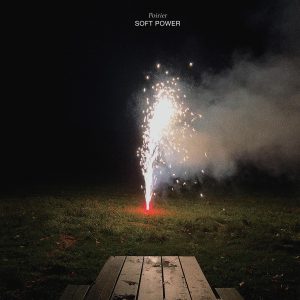On a summer night in Cleveland (the one in Québec’s Eastern Townships), a bunch of friends light up a few fireworks – the kind you find in roadside stores. Among them is Poirier, the veteran Montréal-based electronic music producer. While watching the ignition process with his daughter, the man, whose first name is Ghislain, has an epiphany: what he’s looking at is the cover of his eleventh album, Soft Power.
 “The image was shot with an iPhone!” says the musician, with the same enthusiasm that he felt that night. “I didn’t have my phone on me, so I told Mani [Soleymanlou, a theatre actor and Poirier’s friend]: ‘Take a picture of this. I think it’s my album cover!’ I like the slightly random aspect of the photo, and yet you can give it meaning. A flame in the middle of the night fits with Soft Power. It also fits with my work: fireworks that you buy and light yourself, you can find that everywhere. That image has an extremely local aspect, but there’s also something universal about it. [He pauses and starts laughing] I never thought I’d say something so deep about fireworks!”
“The image was shot with an iPhone!” says the musician, with the same enthusiasm that he felt that night. “I didn’t have my phone on me, so I told Mani [Soleymanlou, a theatre actor and Poirier’s friend]: ‘Take a picture of this. I think it’s my album cover!’ I like the slightly random aspect of the photo, and yet you can give it meaning. A flame in the middle of the night fits with Soft Power. It also fits with my work: fireworks that you buy and light yourself, you can find that everywhere. That image has an extremely local aspect, but there’s also something universal about it. [He pauses and starts laughing] I never thought I’d say something so deep about fireworks!”
Local and universal: those adjectives also happen to best describe the man and the music he’s been creating for more than 20 years, a mix of influences from all over the world – Brazilian, African, Caribbean – that have ultimately become typical of the diversity of his hometown of Montréal.
Generally motivated by his desire to set the dancefloor on fire, this is Poirier’s first album where he’s creating songs in the more traditional sense, with verses, choruses, and heady melodies to boot. His list of guest singers reads like a playlist for the most suave of happy hours: Flavia Coelho, Flavia Nascimento, Boogat, Samito, and Mélissa Laveaux. “I do consider it a song-based album,” he says. “I wanted young children to be able to hum along. I would even say it’s an album of chanson Québécoise!”|
Be that as it may, it’s still light-years away from the likes of Paul Piché, or Vincent Vallières. “Sure, but for me this album is a point of view,” says Poirier. “I’ve always seen myself as a bridge between communities, cultures, and types of music. So my point of view is that even though there are no songs in French on the album, it’s an album of Québécois songs. My world view is typically Québécois. And the hub at the centre of it all is Montréal.”
At a time where we grow increasingly aware of cultural appropriation, such hybridization demands respect for other cultures, and awareness of the limitations and pitfalls of such a position, when the person behind it is a white, Francophone man.
“I’ve been aware of this for 15 years, but Québec has only become aware of it in the last two years,” says Poirier. “When I released soca songs in 2009, and I was interviewed by Trinidadians from Toronto, do you not think they questioned me about it?”
And what did he tell them? “I told them I’d done my homework,” he says. “[Playwright] Robert Lepage didn’t do his homework. And he didn’t take notes when he did his remedial class. You have to listen. If we go back to my analogy to a bridge, you need to know where the banks of the river are to build a bridge. You must be genuinely interested! But that doesn’t mean you have to walk around in a boubou…”
“When I’m working on a song, I often find it hard to listen to it with fresh ears. What I like to do is crank up the volume to 11 and go into the next room over in the house. I look out the window while I listen to it. When you do that, whatever’s wrong with the song becomes instantly obvious.”
In titling his album Soft Power, Poirier also refers to his new rapport with his work, which has been obviously, transformed by the fact that he’s now the father of a three-year-old daughter. “I’ve understood that work is not the only thing that defines us,” admits the self-confessed recovering workaholic. He wants us to re-acquaint ourselves with the old-fashioned value that is ennui.
Isn’t it a little strange that a musician wants his audience to feel ennui? “What I mean is that there’s power in restraint,” says Poirier. “We live in an era where people have become unable to be bored or contemplative. I don’t mean my album is incomplete, but I want it to have space for people to inhabit it. Good stories aren’t the ones where everything is said.”